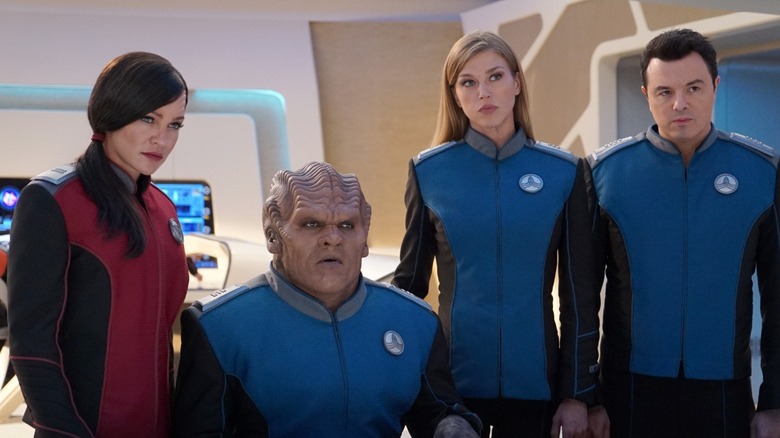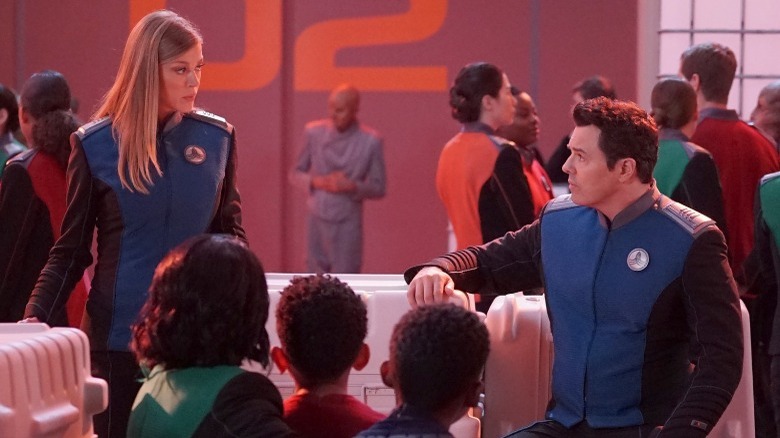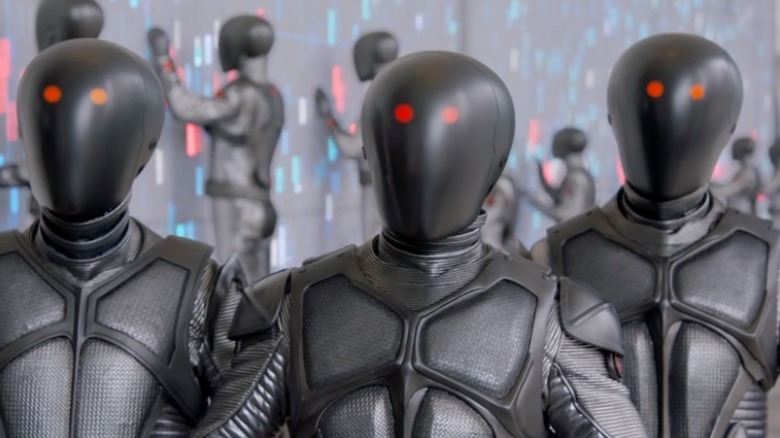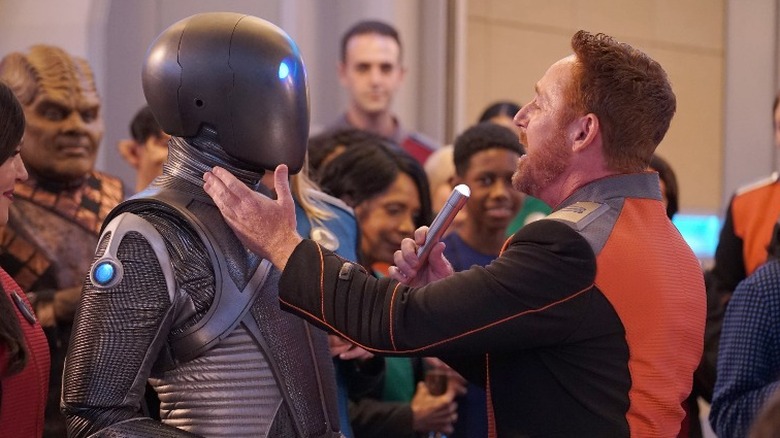It Took Seth MacFarlane An Entire Season To Figure Out What The Orville Should Be
When Seth MacFarlane's television show "The Orville" premiered in 2017, it raised immediate questions and very mixed reviews. Was it a loving parody of the '90s "Star Trek" shows, with similar moral dilemmas but a breezy, comedic tone? Or was it just "Star Trek" with "Family Guy" gags? In its first season, it was hard to tell. It had its share of gross-out humor, pop culture references, and aliens talking like 21st-century bros despite the show being set in the 25th century.
But as the show progressed, its conflicts got thornier. Its jokes became more organically designed around the characters. Rather than parody "Star Trek," it began to feel like an earnest take on that legendary franchise.
For Seth MacFarlane, who created, executive produces, writes, directs, and stars in the show, it is, obviously, a passion project. It's the story of Ed Mercer (MacFarlane), a washed-up officer who is given command of a mid-level exploratory vessel, the USS Orville. His lacking pedigree means that his ship isn't staffed with the best of the best — some members of the ensemble are antisocial and weird, and some are deeply unprofessional. The entertainment comes from plugging this group into classic sci-fi conflicts, with unmissable homages to "Star Trek: The Next Generation" art design.
While "The Orville" is fun from the jump, throwing goofy gags and over-serious plotlines into a blender, it improves tremendously after its first season. For MacFarlane, that self-discovery was just part of the journey of making the show.
Growing pains
Shortly before the show's premiere in 2017, Seth MacFarlane claimed that "The Orville" was the show he "came out to Hollywood to make," according to Daily Dead. For him, there was an imperative to bring a certain feeling back to television, especially sci-fi television: something on the intersection of fun, comfort, and awe, the same feelings viewers had watching those '90s "Star Trek" shows.
Those shows could combine the excitement of adventures in the cosmos with the comfort of, essentially, a workplace sitcom, with complex and loveable characters forging strong relationships and evolving. While the "Star Trek" franchise was moving into the grim, heavily-serialized territory of "Discovery" in 2017 (course correcting recently with the more episodic "Strange New Worlds"), "The Orville" was paying homage to the old school. Episodes would have thrills, new environments, new aliens, and difficult moral quandaries that would see some resolution by their end.
The only problem was that "The Orville," as well-intentioned as it was, had some clear weak spots at the outset. The characters were well-drawn and funny, with small-scale problems that were more compelling than the grand science fiction conceit of a given episode. Lieutenant John LaMarr (J. Lee) reveals that his slacker persona is a mask and that he is secretly brilliant but denies his potential. A strong, affecting storyline. Him having to guide the ship through a two-dimensional anomaly in the same episode? A little forgettable.
Sophomore improvements
When Ed Mercer meets all of his major crew in the show's pilot, they are effectively reduced to one-line gags. There is Isaac (Mark Jackson), the robotic Kaylon who is "racist" against organic life forms. There's Alara Kitan (Halston Sage), the petite-but-deadly Xelayan who, despite her appearance, is stronger than anybody else in the show. Giving them simple, easily identifiable traits revealed the show's dramatic weaknesses, which only became easier to spot with the more one-dimensional episodes in the first season.
By its second season, the show got much better at melding its various modes. Season premiere "Ja'loja" features the taciturn Lieutenant Commander Bortus (Peter Macon), from the (believed-to-be) all-male Moclan species, leading the ship on a pilgrimage to his home planet for ... an annual urination ceremony. While this sounds like a gross-out "Family Guy" gag, it's actually a great hook for getting all the characters to simply hang out and learn about a shipmate's culture.
It reveals new confidence, which made the show deeper, and more serious. The threat of the antagonistic, fundamentalist Krill species is amplified from season 1, and the Moclans' constant reappearances increase their tension with the Planetary Union. But it's the mysterious, organic-life-hating Kaylons (a bit like "Battlestar Galactica's" Cylons, although without the threat of them pretending to be humans) who end up dominating the season. When Isaac returns to his home planet in the great two-parter "Identity," we learn he was sent by the Kaylons to determine if organic life was worth saving. Their answer is no.
New horizons
Beyond "Identity" and the whole spectacular Kaylon arc, the show just got better, more interesting, and dramatic while never losing sight of what made it fun. Scott Grimes, who plays the relative comic relief Gordon (and whose big "Goodbye" song for Isaac only made that dramatic turn more shocking), relished the opportunity for more intense material, telling /Film that it was nice to see his character "grow" as well as how Seth MacFarlane's aims evolved.
MacFarlane likes to subvert expectations with "The Orville," which is one reason its growth has been so rewarding. It's not just a question of the show becoming more serious, but the ways in which it's more serious. In its third season (subtitled "New Horizons"), the episodes are longer, and even more interested in exploring the serious moral ramifications of the character's actions than season 2. What MacFarlane told Decider was that the show's evolution was an organic process:
"A writer said to me at one point in my career, 'You don't find your show. Your show finds you.' ['The Orville'] set out to do one thing, and it quickly became clear that the show really wanted to be something else... We were just allowing our characters to be true to who they were and not have to worry about peppering in jokes every page."
In finding that sweet spot, MacFarlane and company have made "The Orville" one of the best sci-fi shows of the last ten years. Even if they had a rough start.



